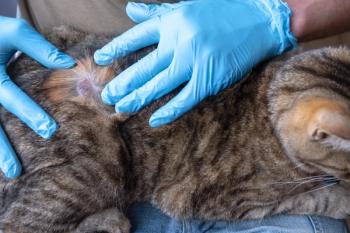
Veterinary groups contend with retail pharmacy issues
AVMA, Oregon VMA look to open communication between veterinarians and pharmacists.
As the U.S. Federal Trade Commission (FTC) prepares to examine veterinary pharmaceutical distribution and prescription writing in an early October workshop, the profession is grappling with how best to respond to challenges some veterinarians are experiencing with retail pharmacists—and how to dispel potential misconceptions held by the government and some members of the public. First order of business? Participate in the FTC workshop.
"We just want to provide as much accurate information as we can about veterinary prescription writing—that there are more things that go into it than just jotting it down on a piece of paper and sending clients on their way," says Ashley Morgan, DVM, assistant director of the American Veterinary Medical Association (AVMA) Government Relations Division. She hopes the FTC will be convinced that legislation such as HR 1406—a bill that would have required veterinarians to provide written prescriptions for clients—is unnecessary (see for more on HR 1406, the Fairness to Pet Owners Act).
Morgan says most veterinarians are happy to provide a prescription if requested by a client and that the proposed legislation is flawed: For example, a written prescription is unnecessary if the veterinarian dispenses the medication himself or herself or if an outside pharmacy takes the prescription over the phone or by e-mail. The AVMA also worries about the potential for abuse if unused written prescriptions find their way into the wrong hands.
Supporters of HR 1406 claim that pet owners need to know they don't have to buy prescriptions directly from their veterinarian. "They want to say veterinarians mark everything up 500 percent and then prevent the client from going elsewhere," Morgan says. She hopes the FTC workshop will provide the opportunity to combat that perception. "Hopefully the FTC will realize there's nothing nefarious going on," Morgan says.
The opportunity to speak before the FTC will also provide a forum to address problems brought to the attention of the AVMA with retail pharmacies dispensing pet pharmaceuticals. "Some of the concerns we have with the nonveterinary retailers is that they don't have a lot of training on veterinary pharmaceuticals," Morgan says. This apparent lack of knowledge prompted action by the Oregon Veterinary Medical Association (OVMA) after members began sharing problems with pharmacists recommending dosage changes or medication substitutions to clients.
Table 1 Veterinarians top 20 challenges
"It appears to be occurring at the big-box pharmacies, not at the mom-and-pop pharmacies," says Glenn Kolb, OVMA executive director. The OVMA has heard of several instances specific to thyroid medication and insulin. In one such example, "the pharmacist said they could switch to a different insulin they said was interchangeable—well, it wasn't."
Problems with phenobarbital dosages have also been reported. "The pharmacist might not change the dosage but might advise the client to cut it in half if the dog is feeling lethargic," Kolb says. "That animal is getting subtherapeutic treatment until hopefully the veterinarian figures out what's happening. There may be a lag time before the animal gets back on the correct dosage."
Kolb says veterinarians worry not just about subtherapeutic dosing and the health of their patients but client perception that they're overdosing animals in general. "They (pharmacists) think the dosage is too high," he says. "They're equating human medicine with animals. It's misleading for the veterinary client." The perception, Kolb says, is "that the veterinarian is overmedicating the pet and that's wrong." To add insult to injury, it can end up costing the client more money once the veterinarian identifies and corrects a pharmaceutical error to get the patient back on the road to recovery.
The risk of jeopardizing patient health and client relationships is frustrating to veterinarians, especially when communication would prevent any such problems, Kolb says. "There's a concern that they (pharmacists) are making a decision without a basis of knowledge," he says. "Dogs and cats are not little people."
The OVMA has set out to work with the Oregon Board of Pharmacy (OBP) to educate pharmacists on the differences among human and veterinary prescriptions. The organization submitted an article that ran in the pharmacy board's August newsletter.
When the OVMA brought the problems to the attention of the pharmacy board, board representatives said they weren't aware of any problems. "They (the pharmacy board) have been pretty receptive to hearing our concerns," Kolb says. Presently, however, no complaints have been filed by veterinarians against pharmacists. "It would send a stronger message if something like that occurred."
Morgan agrees that communication is key. The associations want to get education and information out there for pharmacists and open a dialogue between the professions. "I think everyone has a role to play," she says. "There's communication between veterinarians and clients, veterinarians and pharmacists, and clients and pharmacists."
The AVMA says it wants what the pharmacy boards already formally require: that pharmacists ask questions if something is unfamiliar or unclear and to refer back to the veterinarian. When the OVMA asked the pharmacy board why pharmacists were advising clients on pet medications, the board responded that pharmacists are required to counsel clients. However, OVMA members tell Kolb they're not getting many calls from pharmacies.
Despite these challenges, with the upcoming FTC workshop and fledgling relationship between the OVMA and the OBP, the lines of communication are beginning to open. "The groups are having discussions," Morgan says. "The clients are at the heart of their concerns."
Ultimately, the AVMA wants to find ways to engage with the pharmacy community that don't include legislation. "There's going to constantly be, with nonveterinary retailers, issues that come up and we'll have to continue to be engaged with one another," Morgan says. "The two professional communities can work together to address issues as they come up without federal regulation."
The AVMA encourages veterinarians to report problems to their local veterinary medical associations and file formal complaints with their local pharmacy boards when appropriate.
Newsletter
From exam room tips to practice management insights, get trusted veterinary news delivered straight to your inbox—subscribe to dvm360.






